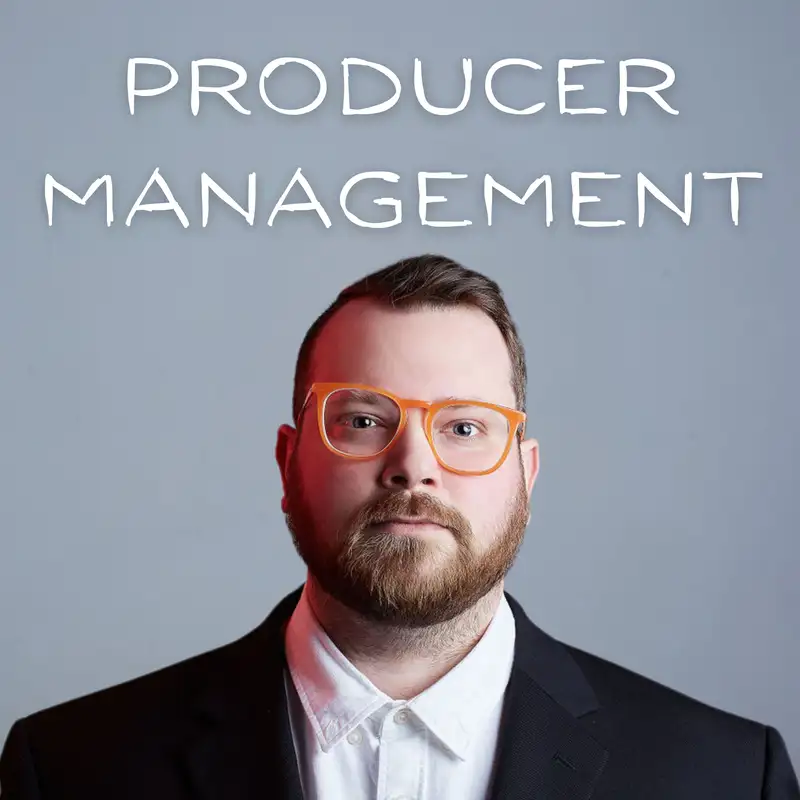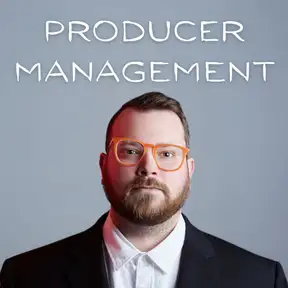
Producers That Earn 6-Figures Do These 4 Things
(0:00 - 2:37)
The producers I've worked with who are earning six figures are typically incredibly good at generating demand for themselves. We're moving away from, I need a producer, to if someone's hiring a producer, it's not going to be because they need to, it's going to be because they... Hey everyone, Daniel Grimmett here. You're listening to Producer Management, the podcast that lets you in on real conversations between professional music producers and their teams, the deals, the strategies, and the unfiltered advice.
This show is brought to you by my company, Dark Label Music. When producers want clarity, strategy, and growth, they call us. We're hired as a strategic partner, part management, part creative and business development, designed for the realities of being a music producer right now.
So whether you're a small studio or a Grammy winning veteran, reach out to us at darklabelmusic.com to see if we can help. So I was having a conversation with a producer yesterday and he asked me a very good question. So he wanted to know what the difference is between producers that earn less than six figures per year versus ones that earn above six figures per year.
This producer is currently doing pretty well. He's in his mid twenties. He just got his first major label cut.
He also freelances and he's like, hey, the guys that are doing six figures a year that are doing the same thing as me, how are they thinking? Like what's different? And again, this is a great question because it's about modeling instead of saying, hey, give me the perfect answer or pathway or the secret tactic, which doesn't exist. It's like, hey, how should I be acting, behaving and functioning in my business to model what's working for these guys? So what is the difference between producers earning maybe 50, 60, 70,000 a year versus the ones that have cracked the six figure per year mark? I myself ran a multiple six figure music production business for many years and have also consulted many other producers who are earning six figures per year. If you listen to this show for a while, you probably know that already.
But basically I can boil this down to four main factors. There are four main factors that separate the producers earning less than versus more than six figures per year. And these are four things that all of you listening to this can control and replicate because yes, it is true that some producers are earning six figures because they produced a hit song and they have royalty stream from that hit song or they got a few massive sync placements this year or maybe they recently signed a six figure publishing deal and all that's great.
(2:37 - 2:59)
But those are all circumstantial things. They aren't always in the producer's control. So that's not what I'm going to be talking about in this episode.
I'm talking about your everyday producer consistently earning six figures per year, despite whether or not they have any big industry wins that year. If they do, then that's just seen as a nice bonus. So let's dive into these four things.
(2:59 - 5:35)
The first one is probably the number one skill any music producer could have in order to succeed, especially as this becomes just more and more competitive in the future. We're moving away from you know, I need a producer to if someone's hiring a producer or working with a producer, it's not going to be because they need to. It's going to be because they want to work with that particular producer.
The producers I've worked with who are earning six figures are typically incredibly good at generating demand for themselves while most others are scraping by to find any opportunity they can get their hands on. Producers with demand are opposite. They're almost in a constant state of, oh crap, I have too many opportunities, too many things to choose from, too many things I could do.
And this allows them to pick the work they want. It allows them to charge more for what they do or, you know, if they sell something, maybe selling that at a higher volume. Demand can seem a bit mysterious and like it's luck, but it's really not.
There is a formula for it. Demand can be broken down into two parts. Part one is offering something that most other people can't do themselves.
This could mean being incredibly skilled, having a unique taste that is hard to replicate, a unique process that is hard to replicate, or just adding more tangible value to what they offer. Those are the common ones that I see. This is why most average producers almost never have demand because the majority of others in the market can just do what they do.
So why would they hire that producer or buy anything that they're selling? But the first part of demand means nothing without the second part, because there are tons of producers who do offer something most others can't do themselves, but at the same time, they aren't in demand. They're still struggling financially, or maybe they're just not making six figures. But why? The reason why is that they don't have part two.
Again, two part formula. So part two is simple. Through any means, they make sure that as many people as possible know about part one.
So part one, offering something most people can't do themselves. Part two, letting as many people as you can know that. This doesn't mean that they are necessarily an influencer with a huge audience.
It just means that enough of the right people know who they are and what they do. So to recap, the formula for demand is offer something most others can't do themselves times the amount of people that know that about you. That's it.
So if you ever only focus on those two things, you could get pretty damn far with your music production business. I'll give you an example of this from my own production company, and this was over 10 years ago. So things are a bit different now, but the principle is the same.
(5:35 - 7:04)
So back in 2014, 2015, remote production was still very new. And a big problem was that artists struggled to find producers that were actually good remotely and had been burned spending money on bad producers. So each time it was a risk for them.
There was a lot of risk. Our approach was different for each artist. I would pair them with a unique team, a writer, producer, mixer, and they were credited in the industry generally, and they fit the project and just gave them access to really great talent that they probably wouldn't have known unless they lived in Nashville or LA or some of these places.
And if anyone on the team didn't work out, then I would just swap them with someone else, and I wouldn't charge the artist to do this. So this essentially just eliminated risk for the artist, and they got a great record every single time. We had an extremely low rate of people not being happy with the work, very, very low, less than 1%.
And back then, ranking on Google, the first page of Google, was still a viable way to get traffic for remote music producers because no one was really doing it. So for part two of Demand, we can't just have the first part without people knowing about it. So part two, I made sure that anytime anyone Googled where or how to find a great producer, legit producer, our website popped up first.
And the first thing they saw was that messaging, behind every great artist is a team. Here's how we do that. Here's who you have access to.
(7:04 - 9:58)
If something doesn't work right, we'll switch them out. You're going to get an incredible record every time. And that little, whatever you want to call it, funnel, I guess, just worked amazingly.
We did multiple six figures per year with that business for a handful of years until I just moved on to consulting and management, the stuff that I do today. So that's difference number one, but let's talk about difference number two when it comes to producers earning above six figures, how they think and act differently. So producers earning six figures in general do not think like freelancers anymore.
They start to think like business owners. It's a completely different mindset and it's almost always necessary to make this transition, at least if you want to consistently earn six figures. Now, freelancers tend to hang on to, I don't know if it's a lot of pride or ego or fear, I'm not sure what it is, but they kind of want to hang on to all this control and kind of do everything themselves.
And listen, I certainly understand that there's times where you need to lean into that, but the difference that I've seen in my clients that earned six figures and the difference in myself as well, we are constantly trying to find ways to get paid more while working less. And on the surface, that may seem kind of like laziness or not wanting to do the work, but it's not, it's just, it's called leverage, right? So freelancers tend to have, again, more of this pride and ego around doing everything themselves, but it's not because they are the only ones that can do every part of the process. It's typically because they lack the skills to attract great team or contractors or whoever, and then be able to transfer their abilities into them in order to remove that thing off of their plate.
It's really, really hard to do. It takes a lot of work and you have to really overcome some fears to do it and let go of a lot of things in order to do it. Every time I hear an interview with a CEO of like a big company, like on a podcast or YouTube or something, they often mention that their number one job is to attract the best talent to work for them.
And there's some like crazy stories of Mark Zuckerberg and some of these guys, like the links that they go through when they really want somebody to work at their companies. Most freelancers are afraid that this means they'll have to kind of do less of what they love doing, but the business savvy producers know that it's actually the opposite. Freelancers will also be afraid to do this because they think it means it will lower the quality of the work or whatever they're doing.
But again, business savvy producers actually know that this is the opposite. If you want to open up your mind to possibilities here, just kind of dabble with this idea, then I recommend reading a book called Buy Back Your Time by Dan Martell. This is probably a favorite amongst the producers in Dark Label.
(9:59 - 14:07)
So to recap, number two is that six-figure producers are incredible at leverage. Basically, anything that helps them get paid more while working less. It also ties into number three because leverage doesn't have to always be created through hiring others.
That was just one example. So after working with many producers earning six figures, I've found it's often common that they will have multiple income streams. And I know a lot of you hear about diversifying your income streams.
Sometimes producers take that as more equals better, but that's not necessarily the advice. You might find this interesting. The majority of producers I work with that earn six figures do have multiple income streams, but the most popular number of income streams they have is actually just two, two main ones.
I'm not counting ancillary income streams like things that are the byproduct of their work, royalties, ad revenue, stuff like that. But they generally have two main ones. Some have more, but two is actually the average.
So when you're thinking about diversifying your income streams, it doesn't always mean more equals better. If you can't maintain a six-figure income with only two income streams, then I would say that's probably a business owner problem more than it is an income stream problem. So most commonly, they will have some kind of flagship service that they offer.
It's usually the main thing that they do, and that's offered to the top 10% of their market. Again, this is tied into the fact that they have demand, right? So they can do this. So the top 10% of the market is really who they're offering their flagship service to.
And then they may have some sort of more passive residual kind of hands-off thing that the other 90% of the market can access. Over time, you kind of grow a lot of demand, and you're like, well, I can't really work with all these people. I'm only one person, but how can I monetize this and still provide value to 100% of my market and give them the option to buy something or spend money with me? Here's an example.
One of my first business partners and producers that I advised, a guy named Austin Hull. You all may know him from Make Pop Music, pretty much from what I remember is set up that way. I don't know if he's doing things different now, but back then it was top 10% of the people reaching out he would work directly with, produce their songs.
He'd be able to charge a premium fee to do that. I'm sure he has some people helping him now. But then the other 90% could buy his sample packs, courses, et cetera.
Then of course there was the ancillary income streams happening on top of that. So two main ones, and then the ancillary stuff, royalties, YouTube ad rev, things like that. This leaves us with number four, the final one, which is the most often overlooked.
This is the final ingredient that I see most common in the producers that I work with earning six figures consistently. That final ingredient is simply time. Typically producers I work with earning six figures have been in the game longer.
They consistently put in the work for many years and they pair that with, of course, the first three points that I made in this episode. That's important. There are plenty of producers who have been doing this for a long time, decades even, that have never earned six figures a year.
Technically most producers don't. It's because they might be playing a different game where they're more so chasing bigger opportunities that will have a big payday at the end. That's fine.
I'm not saying that's good or bad. It's just different. But what I'm referring to when I say time is I'm referring to producers that have just had more time to build their own business brick by brick over many years.
So pulling it all together, the majority of six figure producers that I've worked with, one, they have the ability to create demand for themselves. They understand the two parts to that formula. Number two, they're always seeking ways to earn more while working less.
They're very big on leverage. Three, they generally have multiple income streams, but not too many. Again, on average, it's usually two main ones.
And four, they just have more time in the game. They do those first three things for longer than most other people. If you're serious about reaching that six figure milestone as a producer, start by honestly evaluating where you stand with each of these mindset shifts.
(14:12 - 14:25)
If you go to producermanagement.com, you'll find links to jump on our newsletter, which I highly recommend because it's the perfect companion to the show. And if you enjoy what we're doing here, please leave us a five-star review or share it with a friend. Thanks for listening.
That's the episode.


